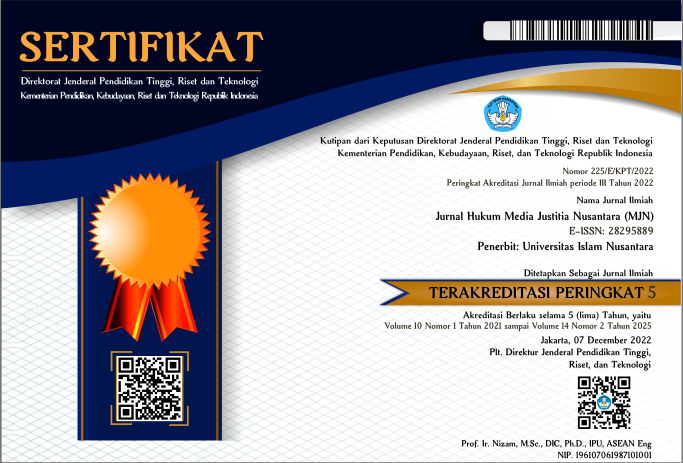Konsep Rehabilitasi Sebagai Implementasi Keadilan Restoratif Tindak Pidana Narkotika
DOI:
https://doi.org/10.30999/mjn.v11i1.1920Keywords:
Rehabilitasi, Keadilan Restoratif, Tindak Pidana NarkotikaAbstract
The research background is related to the impact of the spread of the virus
outbreak in Indonesia on the law enforcement process carried out by the police, especially
related to narcotics crimes committed by children. From the perspective of the nation and
the state, the abuse of narcotics is not only detrimental to oneself, but more than that, it
endangers the continuity of the nation and state because narcotics, to a certain extent,
"damage" the young generation on which the hope of the nation and state is based in the
future. The problems that the writer will formulate are: (1) how can the concept of
rehabilitation be realized through restorative justice for narcotics offenders? (2) how is the
concept of rehabilitation applied to children in a disaster emergency? This study uses
qualitative descriptive data, namely data in the form of descriptions of written words
describing a certain phenomenon and certain behaviors of the object of research being
observed. The results of this study are, first: (1) Restorative justice has a significant role to
play in the resolution of crimes involving children. A restorative criminal justice process has
the view that realizing justice is not only a matter for the government and criminals, but
more than that, it must provide justice in a totality that cannot ignore the interests and rights
of victims and society. Restorative justice aims to realize the recovery of conditions for crime
victims, perpetrators, and the community concerned through a case resolution process that
does not only focus on trying and punishing the perpetrators, especially in cases involving
children. In the sense that restorative justice makes maps of the interests and roles of each
party, both victims and perpetrators of crime, and the community concerned, so that there
is a basis for distributing responsibility due to crimes according to their respective positions
and roles, in order to achieve quality justice. (2) A restorative justice approach in the context
of realizing child protection in the juvenile criminal justice system can be carried out
through non-penal channels and through penal channels. Settlement of juvenile cases in the
criminal justice system prioritizes diversion settlement through a restorative justice
approach. If the settlement fails to reach an agreement, then it will only be resolved through
a court mechanism. So it can be said that settlement through juvenile court is the last
alternative.
Penelitian dilatarbelakangi terkait dengan dampak penyebaran wabah virus di
Indonesia terkait dengan proses penegakan hukum yang dilakukan oleh pihak kepolisian
khususnya terkait dengan tindak pidana narkotika yang dilakukan oleh anak. Dalam
perspektif berbangsa dan bernegara, penyalahgunaan narkotika bukan hanya merugikan diri
sendiri tetapi lebih dari itu membahayakan kelangsungan bangsa dan negara karena
narkotika dalam kadar tertentu “merusak” generasi muda yang menjadi tumpuan harapan
bangsa dan negara di masa yang akan datang. Permasalah yang akan penulis rumuskan yaitu:
(1) Bagaimanakah konsep rehabilitasi dapat diwujudkan melalui keadilan restoratif bagi
pelaku tindak pidana narkotika?; (2) Bagaimanakah konsep rehabilitasi tersebut diterapkan
terhadap anak dalam keadaan darurat kebencanaan? Penelitian ini menggunakan data yang bersifat deskriptif kualitatif, yaitu data yang berupa uraian kata-kata tertulis yang
menggambarkan suatu fenomena tertentu, dan perilaku tertentu dari objek penelitian yang
sedang diamati. Hasil dari penelitian ini adalah, pertama: (1) Keadilan restoratif memiliki
arti penting dalam penyelesaian tindak pidana yang melibatkan anak. Proses peradilan
pidana yang bersifat restoratif berpandangan bahwa mewujudkan keadilan bukan hanya
urusan pemerintah dan pelaku kejahatan, tetapi lebih dari itu harus memberikan keadilan
secara totalitas yang tidak bisa mengabaikan kepentingan dan hak-hak dari korban dan
masyarakat. Keadilan restoratif bertujuan untuk mewujudkan pemulihan kondisi korban
kejahatan, pelaku, dan masyarakat berkepentingan melalui proses penyelesaian perkara yang
tidak hanya berfokus pada mengadili dan meng-hukum pelaku, terutama terhadap kasuskasus yang melibatkan anak. Dalam arti bahwa restorative justice membuat peta tentang
kepentingan dan peran masing-masing, baik korban, pelaku kejahatan, dan masyarakat yang
terkait, sehingga ada dasar untuk mendistribusikan tanggungjawab akibat kejahatan sesuai
dengan posisi dan peran masing-masing, agar tercapai keadilan yang berkualitas
memulihkan. (2) Pendekatan keadilan restoratif dalam rangka mewujudkan perlindungan
terhadap anak dalam sistem peradilan pidana anak dapat dilakukan melalui jalur non penal
dan melalui jalur penal. Penyelesaian perkara anak dalam sistem peradilan pidana lebih
mengutamakan penyelesaian secara diversi melalui pendekatan Keadilan restoratif Jika
penyelesaian tersebut gagal mencapai kesepakatan maka baru diselesaiakan melalui
mekanisme pengadilan. Jadi dapat dikatakan bahwa penyelesaian melalui pengadilan anak
adalah alternatif terakhir.













